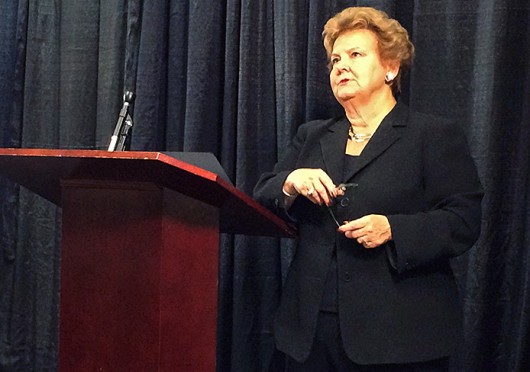
Former Ohio Attorney General Betty Montgomery answers questions Nov. 18 about the second cultural investigation into OSU’s marching band.
Credit: Logan Hickman / Campus editor
Flaws in the Ohio State Marching Band’s culture were partially a result of limited university oversight, according to the findings of a second cultural investigation into the band that were released Tuesday.
The investigation was led by former Ohio Attorney General Betty Montgomery and found the band has been isolated from routine university supervision for more than 50 years — part of the reason for limited oversight.
Tensions between the School of Music and the marching band widened that gap, the investigation’s final report said. Personality conflicts, differences in the quality of facilities, concerns over funding and disparities between the School of Music, in particular, were mentioned.
Montgomery’s task force was commissioned to conduct an assessment of the band’s culture, review university processes and oversight and provide counsel on Title IX compliance issues. Title IX states schools that receive federal funding can’t discriminate against people based on gender.
Even though the investigation found the band contains a “culture of excellence, hard work and esprit de corps,” the final report made 37 recommendations to help correct some of the issues. Some of them seek to eliminate certain band traditions and create more effective oversight.
One recommendation was to reinstitute the tradition of upperclassmen giving nicknames to rookies after it was banned following the first investigation.
The task force found that rookie nicknames are still happening and have since gone underground. They recommended nicknames be permitted as long as they are reviewed by the compliance officer. Students using unapproved nicknames should receive disciplinary measures, the report said.
Other recommendations include leaving the band in the School of Music, requiring training for bus chaperones and creating clear guidelines for Fesler Night videos.
Some past videos shown on Fesler Night — an annual night when newly selected band members are introduced to current members, staff and traditions — were sexual in nature.
One example from 2012 explained a video where a topless female band member opened a door to a surprised pizza deliveryman. A video from 2011 was described where students presented inappropriate nicknames and nudity to Waters, who appeared as himself in the video, for approval.
Moving forward, OSU plans to review the task force’s recommendations and take action, university spokesman Chris Davey said in an emailed statement Tuesday.
“Today’s report confirms that changes needed to be made within the band and its culture. We take the report’s conclusions very seriously,” he said.
Montgomery’s findings took about twice the time expected, based on the early October deadline given to her by OSU President Michael Drake.
She said part of the reason for the delay was because of the extensive interviews she and her team conducted for the investigation.
The task force interviewed 185 individuals — including current and former band members, staff and other “interested parties,” according to a Tuesday press release from the public relations firm representing Montgomery’s team.
The task force hired three outside firms to help in the investigation. At least two of those firms were paid a combined $885 an hour, and while the contract with one of those firms limited the total compensation to $49,000, the other agreement did not specify a limit.
Meanwhile, Waters — who is suing the university and some of its leaders — submitted new court filings this week saying OSU breached an implied contract by firing him, even though he was an at-will employee.
Waters’ move came about a month after OSU asked the court to dismiss his case because of his at-will status. It also said he knew of a problematic, sexually charged culture in the marching band and didn’t address the problems.
Waters is suing for a minimum of $1 million in compensatory damages, in addition to seeking punitive damages, attorney fees and reinstatement. His lawsuit says the university discriminated against him on the basis of gender and that OSU did not provide him with due process after the initial investigation into the band’s culture.
Water’s attorney David Axelrod has since said Waters will look for a new job.
“(Waters) is a productive person and he’s not a person who is going to sit around and wait for something to come to him,” Axelrod said. “Maybe he will make the ‘best damn band in the land for somebody else.’”
The university has said it plans on naming a new director by February. University Bands director Russel Mikkelson and associate director Scott Jones are serving as the interim directors until that permanent director is selected.
The U.S. Department of Education’s Office of Civil Rights announced after a compliance review of the university was concluded Sept. 11 that it will enter into an agreement with OSU to ensure proper Title IX obedience, according to a release.
In the release, the OCR agreed with the university that a “sexually hostile environment” within the band violated Title IX and praised the university for its handling of the situation.
OSU was one of 55 U.S. colleges and universities being investigated by the department for its handling of sexual abuse complaints under Title IX. The review began in 2010 and was not complaint-based, the release said.


